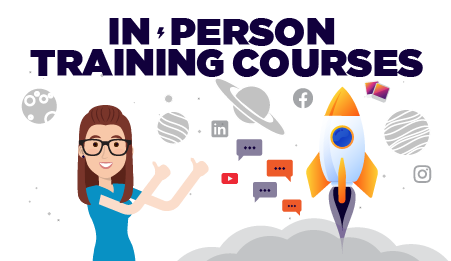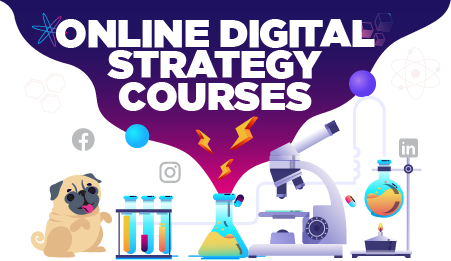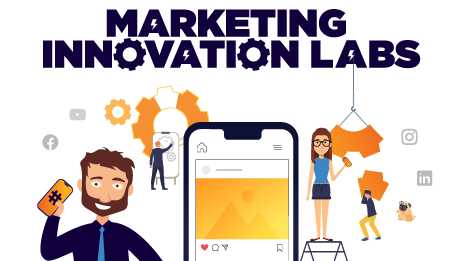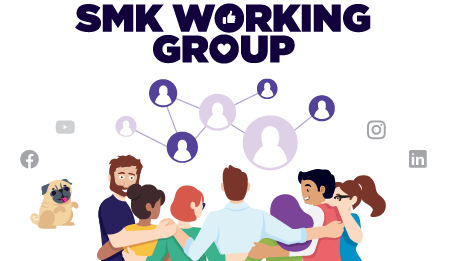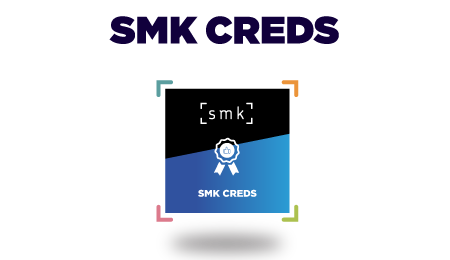Transform your email marketing into a powerful, strategic tool to elevate your email marketing
Email Marketing Masterclass: Data, Design & CRM
- Learn Online (Live & On-Demand)
- 6th June - 27th June
- 8 hours (8 x 1hr Weekly Modules)
- $1,295.00 (this course only) OR Included in SMK Membership
Elevate a robust email marketing strategy to align campaigns with business goals. Learn how to build and segment email lists, craft compelling content, and design visually effective emails. Delve into email automation, performance measurement and deliverability management. Explore future trends like AI, interactive emails and evolving privacy regulations, providing you with the latest techniques and knowledge to enhance your email marketing efforts.
Purchase Options:
Sign up for SMK Digital Excellence on a Standard Plan (or above) and access the full suite of Online Digital Strategy courses annually.
*Prices exclude GST, charged in Australia only.
Trusted by Companies like:












What will you learn?
Strategic Alignment of Marketing and Business Goals
Learn how to closely align your B2B marketing strategies with your company’s broader business objectives to drive cohesive and measurable outcomes.
Master Content Marketing for B2B
Gain expertise in creating compelling content specifically designed for B2B audiences, enhancing visibility and engagement across digital platforms for brand building or lead generation.
Effective Use of CRM and Marketing Automation
Develop the skills to implement and utilise CRM systems and marketing automation tools effectively, optimising lead management and conversion processes for better customer relationships and sales efficiency.
Advanced Social Media Tactics for B2B Engagement
Master the use of social media platforms like LinkedIn, YouTube, and Facebook to build brand authority, engage with business clients, and leverage social selling techniques to drive B2B sales.
Analytics and Performance Measurement Skills
Acquire the ability to measure and analyse the effectiveness of B2B marketing campaigns using key metrics and KPIs, enabling continuous improvement and strategic decision-making based on data.
ACCESS THIS COURSE ONLY OR BECOME AN SMK MEMBER TO ACCESS ALL SMK TRAINING COURSES + MORE
Course Overview
SMK’s 2024 B2B Marketing Masterclass is a comprehensive course tailored for marketing professionals aiming to advance their expertise in B2B marketing. This course covers essential strategies from social media to SEO, effective CRM practices and much more, ensuring participants are well-equipped to drive business growth and improve performance.
Join us for an in-depth exploration through eight engaging modules, where you’ll gain practical experience and expert insights into the latest B2B marketing trends and tools. Designed to enhance your skills and strategic thinking, this masterclass will empower you to navigate the complexities of B2B marketing, boost your professional capabilities, and deliver tangible results in your marketing campaigns.
Detailed Course Breakdown
MODULE ONE:
Introduction to Email Marketing
- 6th June
- 10am - 11am AEST
- Strategic Role of Email Marketing:
- Aligning with Business Goals: Learn how to set measurable goals for email marketing campaigns that support business strategies.
- Creating a Strategy: Develop a comprehensive email marketing strategy from audience research to execution.
- Email Marketing vs. Other Channels:
- Comparison with Other Channels: Analyse the strengths and weaknesses of email marketing compared to social media, SEO, PPC, and content marketing.
- Advantages and Challenges: Discuss the benefits and potential challenges of email marketing, including deliverability issues.
- Role in Digital Strategy:
- Supporting Other Efforts: Explore how email marketing drives engagement and supports other marketing efforts.
- Achieving Objectives: Identify goals achievable through email marketing, such as brand awareness and driving sales.
MODULE TWO:
Building Your Email List
- 7th June
- 10am - 11am AEST
- Opt-in Methods and Best Practices:
- Types of Opt-in Forms: Discuss the advantages and disadvantages of single vs. double opt-in forms.
- Effective Form Design: Best practices for creating persuasive opt-in forms and landing pages.
- List Segmentation:
- Targeted Marketing: Benefits of segmentation for personalised messaging.
Segmentation Criteria: Key factors for segmentation, including demographics and behaviour.
- Targeted Marketing: Benefits of segmentation for personalised messaging.
- Legal Considerations:
- Regulations Overview: Major email marketing regulations and their implications.
- Compliance Best Practices: Maintain transparency and build trust with best practices.
MODULE THREE:
Crafting Effective Email Copy
- 13th June
- 10am - 11am AEST
- Crafting Compelling Copy:
- Subject Lines and Openings: Techniques for writing engaging subject lines and opening lines.
- Body Content and CTAs: Best practices for structuring content and crafting compelling calls-to-action.
- Advanced Techniques:
- Personalisation and Dynamic Content: Using subscriber data for personalisation and implementing dynamic content.
- Storytelling and Psychological Triggers: Employing storytelling and psychological principles like urgency and social proof.
- Optimising Email Copy:
- A/B Testing and Performance Analysis: Conducting A/B tests and analysing performance data.
- Feedback and Continuous Improvement: Gathering feedback and iterating on email copy to enhance results.
MODULE FOUR:
Email Design Best Practices
- 14th June
- 10am - 11am AEST
- Email Layout and Structure:
- Responsive Design: Ensure emails are mobile-friendly and look good on all devices.
- Layout Best Practices: Use clear and consistent layouts to guide the reader’s eye.
- Visuals and Multimedia:
- Use of Images: Best practices for selecting and placing images, including alt text for accessibility.
- Incorporating Multimedia: Effectively use videos, GIFs, and interactive elements to enhance engagement.
- Typography:
- Font Choices: Select readable and on-brand fonts.
- Text Formatting: Use headings, bullet points, and short paragraphs for clarity.
MODULE FIVE:
Email Marketing Automation
- 20th June
- 10am - 11am AEST
- Introduction to Automation:
- Definition and Benefits: Understanding what email automation is and its key benefits.
- Examples: Types of automated email campaigns.
- Setting Up Sequences:
- Planning Workflows: Steps to create effective automated workflows.
- Tools and Platforms: Overview of popular automation tools.
- Measuring Success:
- Key Metrics: Important metrics for automated campaigns.
- Optimising Performance: Best practices for tracking and improving performance.
MODULE SIX:
Analysing Email Marketing Performance
- 21st June
- 10am - 11am AEST
- Key Metrics and KPIs:
- Definitions: Important metrics like open rates and conversion rates.
- Additional Metrics: Other indicators like bounce rates and unsubscribe rates.
- Performance Tracking Tools:
- Overview: Popular email marketing analytics tools.
- Setup: Best practices for setting up tracking and reporting.
- Data Interpretation:
- Analysis Best Practices: Methods for analysing email marketing data.
- Creating Reports: How to generate actionable insights from data.
MODULE SEVEN:
Managing Email Deliverability
- 27th June
- 10am - 11am AEST
- Understanding Deliverability:
- Influencing Factors: Factors affecting email deliverability.
- Common Issues: Common deliverability problems and solutions.
- Sender Reputation:
- Importance: Significance of sender reputation.
- Authentication: Methods like SPF, DKIM, and DMARC.
- Avoiding Spam Filters:
- Techniques: Best practices to keep emails out of spam folders.
- Content Setup: Optimising email content and technical setup.
- List Hygiene:
- Cleaning Lists: Importance of maintaining a clean email list.
- Maintenance Techniques: Best practices for list hygiene and maintenance.
MODULE EIGHT:
Future Trends in Email Marketing
- 28th June
- 10am - 11am AEST
- AI and Machine Learning:
- Applications: Use of AI for personalisation and optimisation.
- Benefits and Challenges: Pros and cons of using AI.
- Interactive Emails and AMP:
- Interactive Elements: Using polls, surveys, and forms in emails.
- AMP for Email: Benefits of AMP technology for emails.
- Privacy Trends:
- Evolving Regulations: Impact of new privacy laws on email marketing.
- Data Protection: Best practices for data protection and compliance
- Evolving Regulations: Impact of new privacy laws on email marketing.
Why become a SMK Digital Excellence Member?
ACCESS THIS COURSE ONLY OR BECOME AN SMK MEMBER TO ACCESS ALL SMK TRAINING COURSES + MORE
Your SMK Instructor

James Fitzgerald
Executive Director of Programming, SMK
James Fitzgerald is the Executive Director of Programming at SMK. SMK is a specialist learning and development organisation which exists to help businesses use social media, mobile and digital channels more effectively. As Executive Director of Programming James is responsible for devising and developing all blue chip and corporate education programs.
James is one of the most widely respected figures in digital marketing in APAC, having educated over 15,000 senior business decision makers on how they can use these channels more effectively, including leaders from: United Nations, Air NZ, MYER, McDonalds, NAB, P&G, Tourism Australia, Ralph Lauren, Westfield and various Government departments, to name just a few.

